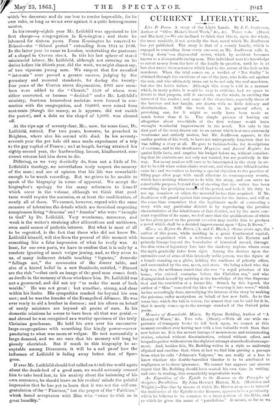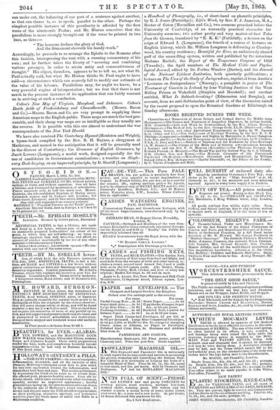An Exposition of the Epistle to the Romans on the
Principles of Scripture Parallelism. By John Howard Hinton, M.A. (Houlstou and Wright)—The clue by means of which Mr. Hinton proposes to unravel the intricacies of the Epistle to the Romans, appears to be a peculiarity which he believes to be common to a large portion of the Bible, and to which he gives the name of "parallelism." It means, as far as wo can make out, the balancing of one part of a sentence against another, so that one clause is, so to speak, parallel to the other. Perhaps the simplest possible instance of this peculiarity is afforded by the first verse of the nineteenth Psalm ; and Mr. Hinton conceives that the parallelism is more strongly brought out if the verse be printed in two ines, as thus:-
" The heavens declare the glory of God, And the firmament showeth his handy-work."
Accordingly, he proceeds to re-arrange the Epistle to the Romans after this fashion, interspersing the text with a running commentary of his own ; and he further takes the liberty of "severing and combining various passagos, in order to attain unity and consecutiveness of thought." His object, therefore, appears to be to tell us, not what St. Paul antually said, but whit Mr. Hinton thinks St. Paul ought to have said-a circumstanco which can scarcely fail to modify our estimate of the value of his labours. Parallelism may, for aught we know, be a very powerful engine of intorpretation ; but wo fear that there is not much in the present instance of its application that can fairly warrant us in arriving at such a conclusion.































 Previous page
Previous page